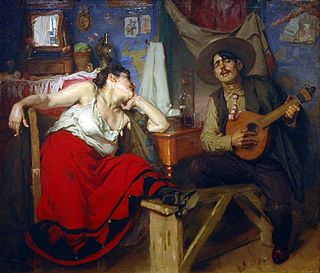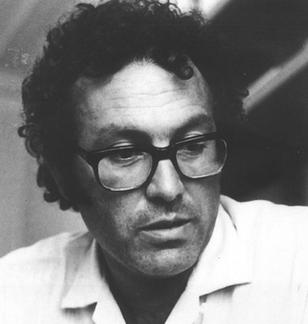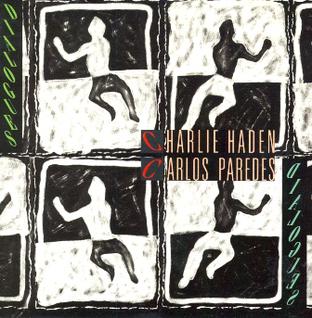
Fado is a music genre which can be traced to the 1820s in Lisbon, Portugal, but probably has much earlier origins. Fado historian and scholar Rui Vieira Nery states that "the only reliable information on the history of fado was orally transmitted and goes back to the 1820s and 1830s at best. But even that information was frequently modified within the generational transmission process that made it reach us today."

Coimbra is a city and a municipality in Portugal. The population of the municipality at the 2021 census was 140,796, in an area of 319.40 square kilometres (123.3 sq mi). The fourth-largest agglomerated urban area in Portugal after Lisbon, Porto, and Braga, it is the largest city of the district of Coimbra and the Centro Region. About 460,000 people live in the Região de Coimbra, comprising 19 municipalities and extending into an area of 4,336 square kilometres (1,674 sq mi).

Portuguese music includes many different styles and genres, as a result of its history. These can be broadly divided into classical music, traditional/folk music and popular music and all of them have produced internationally successful acts, with the country seeing a recent expansion in musical styles, especially in popular music.

The culture of Portugal is a very rich result of a complex flow of many different civilizations during the past millennia. From prehistoric cultures, to its Pre-Roman civilizations, passing through its contacts with the Phoenician-Carthaginian world, the Roman period, the Germanic invasions of the Suebi, Buri and Visigoths, Viking incursions, Sephardic Jewish settlement, and finally, the Moorish Umayyad invasion of Hispania and the subsequent expulsion, during the Reconquista, all have made an imprint on the country's culture and history.

The University of Lisbon is a public research university in Lisbon, and the largest university in Portugal. It was originally founded in 1911, but the present structure of the university dates from the 2013 merger of the former University of Lisbon (1911–2013) and the Technical University of Lisbon (1930–2013).

The Associação Académica de Coimbra – Organismo Autónomo de Futebol (AAC-OAF), also referred to as Académica de Coimbra or simply Académica, is a professional football club based in Coimbra, Portugal.

The University of Coimbra is a public research university in Coimbra, Portugal. First established in Lisbon in 1290, it went through a number of relocations until moving permanently to Coimbra in 1537. The university is among the oldest universities in continuous operation in the world, the oldest in Portugal, and played an influential role in the development of higher education in the Portuguese-speaking world. In 2013, UNESCO declared the university a World Heritage Site, noting its architecture, unique culture and traditions, and historical role.

Amália da Piedade Rebordão Rodrigues, better known as Amália Rodrigues or popularly as Amália, was a Portuguese fadista.

Carlos Paredes was a virtuoso Portuguese guitar player and composer. He is regarded as one of the greatest players of Portuguese guitar of all-time.
The Associação Académica de Coimbra (AAC) is the students' union of the University of Coimbra (UC). Founded in Coimbra on November 3, 1887, it is the oldest students' union in Portugal. It is also the biggest Portuguese students' union belonging to an independent institution, since it represents all the students of its university, who gain automatic membership into the AAC as students of the University of Coimbra.

The Queima das Fitas is a traditional festivity of the students of some Portuguese universities, organized originally by the students of the University of Coimbra.

José Manuel Cerqueira Afonso dos Santos, known professionally as José Afonso and also popularly known as Zeca Afonso, was a Portuguese singer-songwriter. He is widely regarded as one of the most influential figures in the history of Portugal's folk and protest music scene. His music played a significant role in the resistance against the dictatorial Estado Novo regime, making him an icon in Portugal.

The Portuguese guitar or Portuguese guitarra is a plucked string instrument with twelve steel strings, strung in six courses of two strings. It is one of the few musical instruments that still uses watch-key or Preston tuners. It is iconically associated with the musical genre known as Fado.

The Portuguese term praxe describes the whole of student traditions in universities or, more often, to the initiation rituals freshmen are subjected to in some Portuguese universities.
Orfeon Académico de Coimbra (O.A.C.) is the oldest and one of the most famous academic choirs in Portugal. It was established in 1880 by the then University of Coimbra's law student João Arroio, with the name Sociedade Choral do Orpheon Académico.

The Verdes Anos fado group is a Portuguese musical group founded in 1996, known for performing and popularizing Coimbra's Fado and the Portuguese guitar.
Artur Paredes was a Portuguese guitar player born in the city of Coimbra, Portugal. He was the biological son of Gonçalo Rodrigues Paredes and Maria do Céu.

FEUP Fado Group is a Portuguese student group that performs Fado

Dialogues is an album by guitarist Carlos Paredes and bassist Charlie Haden recorded in 1990 and released on the Antilles label.

The symbols of Portugal are official and unofficial flags, icons or cultural expressions that are emblematic, representative or otherwise characteristic of Portugal and of its culture.
















